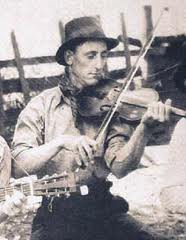Annotation:Lost Train Blues: Difference between revisions
No edit summary |
No edit summary |
||
| (9 intermediate revisions by 2 users not shown) | |||
| Line 1: | Line 1: | ||
---------- | |||
---- | {{TuneAnnotation | ||
|f_tune_annotation_title=https://tunearch.org/wiki/Annotation:Lost_Train_Blues > | |||
'''LOST TRAIN BLUES.''' AKA and see "[[Puncheon Floor (2)]]," "[[White Mule]]." | |f_annotation='''LOST TRAIN BLUES.''' AKA and see "[[Puncheon Floor (2)]]," "[[White Mule]]." American, Reel (2/4 and cut time). USA, Tenn. G Major. Standard tuning (fiddle). AABB (Brody): ABBCCCBB (Phillips). Some accounts credit this somewhat improvisational composition (e.g. the train sounds) to Arthur Smith (Tenn), however, Charles Wolfe thinks Smith may have learned it from the Crook Brothers (Tenn.) who often featured it on the Opry. Smith and the Crook Brothers were both performers at the early Grand Ole Opry, and the tune was a favorite with the latter. While Smith's version was undeniably influential, the piece was recorded earlier by Da Costa Woltz's Southern Broadcasters, and by Henry Whitter; both recordings featured the tune played on harmonica. See also note for "[[Puncheon Floor (2)]]." | ||
[[File:arthursmith.jpg|250px|thumb|left|Fiddlin' Arthur Smith]] | |||
<br> | <br> | ||
<br> | <br> | ||
Major Franklin's "[[Whoa Mule (2)]]" is a similar tune. | |||
|f_source_for_notated_version=Lyman Enloe [Phillips]; Arthur Smith [Hartford/Devil's Box]. | |||
|f_printed_sources=Brody ('''Fiddler's Fakebook'''), 1983; p. 179. Stephen F. Davis ('''Devil's Box'''), vol. 24, No. 4, Winter 1990; p. 20. Phillips ('''Traditional Music in America, vol. 2'''), 1995; p. 82. | |||
|f_recorded_sources=Bluebird 5858-A (78 RPM), Fiddlin' Arthur Smith. Bluebird 5858 (78 RPM), Arthur Smith (1935). County 524, "Da Costa Woltz's Southern Broadcasters; 1927 Recordings." County 546, Arthur Smith- "Arthur Smith, Vol. 1." County 745, John Ashby- "Down On Ashby's Farm." County 762, Lyman Enloe- "Fiddle Tunes I Recall." Gennett 6187 (78 RPM), Da Costa Woltz's Southern Broadcasters. Heritage 054, Ralph Blizzard - "Brandywine '83: Music of French America" (1984). OKeh 40029 (78 RPM), Henry Whitter. Rebel 1515, Curly Ray Cline- "My Little Home in West Virginia." | |||
|f_see_also_listing=See/hear Arthur Smith play the tune in a clip from a mid-1940's 'B' western [http://www.youtube.com/watch?v=XTsRQRqzqas]<br> | |||
See/hear Arthur Smith play the tune in a clip from a mid-1940's 'B' western [http://www.youtube.com/watch?v=XTsRQRqzqas]<br> | |||
Hear Fred Perry's June, 1939, version, recorded in the field at the State Penitentiary, Raiford, Florida, by John and Ruth Lomax [http://memory.loc.gov/afc/afcss39/355/3556b1.mp3]<br> | Hear Fred Perry's June, 1939, version, recorded in the field at the State Penitentiary, Raiford, Florida, by John and Ruth Lomax [http://memory.loc.gov/afc/afcss39/355/3556b1.mp3]<br> | ||
Hear Price Goodson's harmonic recording at Juneberry 78's [http://www.juneberry78s.com/otmsampler/589%20Price%20Goodson%20-%20Lost%20Train%20Blues.mp3]<br> | |||
Jane Keefer's Folk Music Index: An Index to Recorded Sources [http://www.ibiblio.org/keefer/l12.htm#Lostrbl1]<br> | Jane Keefer's Folk Music Index: An Index to Recorded Sources [http://www.ibiblio.org/keefer/l12.htm#Lostrbl1]<br> | ||
}} | |||
------------- | |||
---- | |||
Latest revision as of 19:46, 19 June 2023
X:1 T:Lost Train Blues C:Arthur Smith M:2/4 L:1/8 R:Reel N:Transcribed by John Hartford from the playing of Arthur Smith B:Stephen F. Davis - "Devil's Box", vol. 24, No. 4, Winter 1990, p. 20. Z:AK/Fiddler's Companion K:G P:A e>g f^d-|^d/e/c/B/ G/B/c/^d/|ef/a/ f-^e- e/d/c/c/ B/G/[GB]| g>a g-b-|b/g/a/g/ e/g/g-|g/a/b/a/ g/f/g/a/|g/d/c/B/ A/G/[GB]|| P:B +slide+B>A G>A|B/G/A/G/ E/GA/|+slide+B.A Gg|=f/e/d/c/ B/G/[GB]:| P:C ||+slide+[B4d4]|[_B/^c/][=B/d/][_Bc][B2c2]|+slide+[Bd]>[Bd] [_B_d][Ac]|[G3B3]|| P:D "Richochet:" D/F/||G/B/A/G/ G/B/A/G/|G/B/A/G/ G/B/A/G/|G/B/A/G/ G/B/e/f/|g/e/d/c/ B/G/:| P:E +slide=B>A G>A| B/A/A/G/ E/GA/|B>A Gg-|=f/e/d/c/ c/A/[GB]:|
LOST TRAIN BLUES. AKA and see "Puncheon Floor (2)," "White Mule." American, Reel (2/4 and cut time). USA, Tenn. G Major. Standard tuning (fiddle). AABB (Brody): ABBCCCBB (Phillips). Some accounts credit this somewhat improvisational composition (e.g. the train sounds) to Arthur Smith (Tenn), however, Charles Wolfe thinks Smith may have learned it from the Crook Brothers (Tenn.) who often featured it on the Opry. Smith and the Crook Brothers were both performers at the early Grand Ole Opry, and the tune was a favorite with the latter. While Smith's version was undeniably influential, the piece was recorded earlier by Da Costa Woltz's Southern Broadcasters, and by Henry Whitter; both recordings featured the tune played on harmonica. See also note for "Puncheon Floor (2)."

Major Franklin's "Whoa Mule (2)" is a similar tune.

